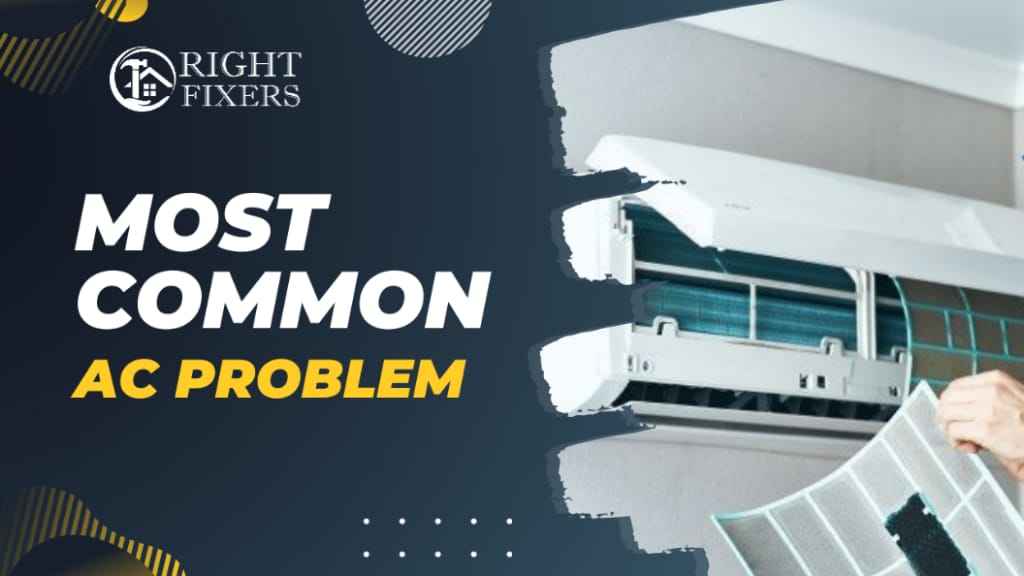You're sweating because it's getting hotter, right? We might forget something important in our busy lives – like our home's super helpful air conditioning (AC) system.
Sometimes, our AC works too much and doesn't get the necessary care, so it stops working. When this happens, we must fix it fast to stop our home from getting too hot or flooding. The cool thing is that we can solve some of the common AC problems quickly.
AC Not Working at All: When Silence Speaks Volumes
Imagine that your AC, which usually makes comforting sounds, suddenly goes completely quiet. No humming, no breeze – just silence. It's like your cooling buddy has decided not to talk anymore. But don't worry, before you call for professional help, let's prepare to fix it ourselves with solutions. We'll tackle the challenge of an AC that's not working together!
Initial Steps to Check AC Not Working
Check Thermostat Settings: Ensure the thermostat is set to "cooling" mode and at the desired temperature.
Inspect Power Supply: Ensure the AC unit is correctly connected to the power source and the circuit breaker is not tripped.
Thermostat Batteries: Check if the thermostat batteries need replacing, as they can sometimes cause issues.
Air Filter Check: Examine the air filter; if it's dirty or clogged, it can restrict airflow and cause problems.
Clogged Condensate Line: If you notice water pooling around the unit, it might be due to a clogged condensate line.
Blocked Air Vents: Ensure that air vents are not blocked or obstructed by furniture or other items.
Inspect Outdoor Unit: If the outside unit isn't working, check for debris or obstructions around it.
Check for Cooling and Heating: Sometimes, the AC may not work if it's set to "heat" mode instead of "cool."
Tripped Breaker: Look for any tripped circuit breakers related to the AC system.
Your AC Is Blowing Warm or Hot Air: The Heatwave Intruder
You're excited for a cool breeze but feel warm air instead. It's like asking for ice cream and getting a hot potato! But don't worry; we'll figure out why your AC is acting warm and help it get back to being cool.
Step By Step Solution of AC Is Blowing Warm
Inspect Air Filter: A dirty or clogged filter can restrict airflow and cause the AC to blow warm air. Check the filter and replace it if it's dirty.
Verify Air Vents: Ensure all air vents are open and not blocked by furniture, curtains, or other items. Proper airflow is crucial for your AC to work effectively.
Inspect Outdoor Unit: If debris, plants, or dirt block the outdoor unit, it can hinder the AC's cooling process. Clear any obstructions around the unit.
Check Refrigerant Levels: Low refrigerant levels can lead to warm air blowing. This requires a professional AC Maintenance service to check and recharge the refrigerant.
Test for Leaks: Refrigerant leaks can cause the AC to blow warm air. A qualified technician can inspect for leaks and repair them.
Clean Condenser Coils: Dirty condenser coils can reduce the AC's cooling capacity. Clean the coils gently with a soft brush or consult a professional handyperson Service.
Consider Sun Exposure: If your home gets direct sunlight, it can raise indoor temperatures. Use blinds or curtains to block sunlight during the hottest parts of the day.
Consult HVAC Technician: If none of these steps solve the issue, it's best to contact a RightFixers professional HVAC technician. They can diagnose the problem accurately and provide the necessary repairs.
Uneven Temperature Distribution: The Thermal Tango
If you are facing a problem, some rooms in your house are super cold, like the North Pole, while others are hot, like the Sahara desert. It's like an uneven distribution of temperatures that could be better. But don't worry; we're here to make things even and comfy again. We'll show you how to use curtains and dampers to help every part of your home feel just right.
Check Air Vents:
Make sure all air vents are open and unblocked.
Adjust vents to direct airflow evenly around the room.
Close Doors and Windows:
Keep doors and windows closed in rooms you want to cool evenly.
This helps maintain a consistent temperature.
Use Fans:
Place fans strategically to circulate cool air throughout the room.
Ceiling fans can help distribute air more effectively.
Manage Sunlight:
Close curtains or blinds in sunny areas to prevent overheating.
Use reflective window coverings to block out excessive heat.
Insulate Properly:
Ensure proper insulation in your home to keep cool air from escaping.
This helps maintain a balanced temperature throughout.
Balance Airflow:
Adjust air vents to balance airflow between rooms.
This prevents one area from getting too hot or too cold.
Regular Maintenance:
Schedule regular maintenance for your AC system.
Clean filters, coils, and ducts to ensure efficient airflow.
Consult a Professional:
If the issue persists, consult an HVAC professional.
They can assess your system and provide solutions for better temperature balance.
AC Making Noises: Taming the Unwanted Symphony
Your air conditioner isn't only cooling; it's making a lot of noise, like a loud party. A noisy AC can be like having a not-so-friendly DJ at your peaceful gathering. But don't worry; we'll figure out those loud sounds and help you bring back the quiet and calm you want.
Check for Debris:
Look around the outdoor unit for leaves, sticks, or debris.
Remove anything that might be causing the noise.
Inspect Fan Blades:
Turn off the AC and check the fan blades for any damage.
If blades are bent or damaged, they can create noises.
Secure Panels:
Ensure all panels and covers on the unit are securely fastened.
Loose panels can rattle and cause noises.
Clean Condenser Coils:
Dust and dirt on coils can lead to strange noises.
Gently clean the coils to prevent this issue.
Tighten Screws:
Check for loose screws or bolts on the unit.
Tighten them to reduce vibrations and noise.
Clear Surroundings:
Make sure no debris or objects is touching the unit.
These can create vibrations and unwanted sounds.
Listen for Specific Noises:
Different noises can indicate different issues.
Listen for rattling, buzzing, or screeching sounds.
Turn Off and On:
Try turning off the AC for a while and then turning it back on.
Sometimes a quick reset can solve minor noise problems.
Contact a Professional:
If the noise persists or is severe, contact an HVAC professional.
They can diagnose the issue and provide necessary repairs.
Conclusion
When it's super hot outside, your air conditioner should be your best friend, helping you beat the heat. This guide gives you the tools to tackle common AC problems like a pro. From getting cool air back to fixing leaks, you now have the power to make your cooling system awesome again. Feel confident, and watch your AC problems disappear







